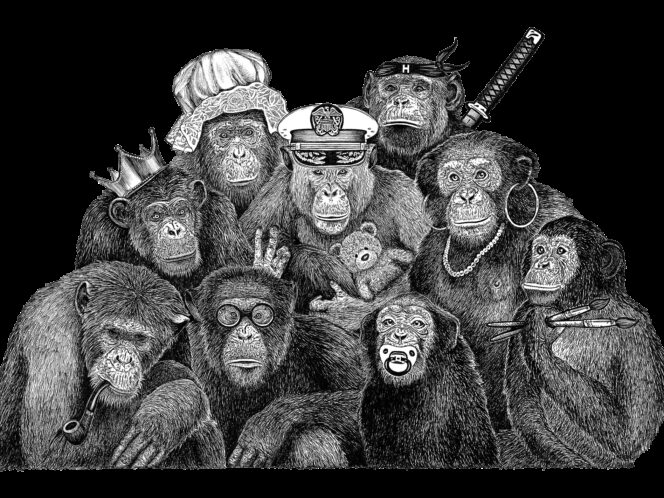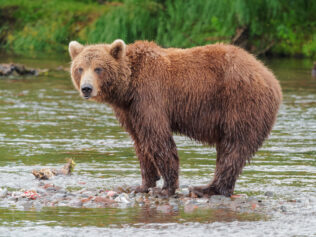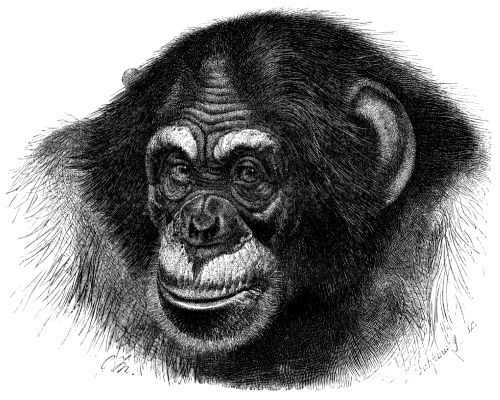
time 10 minutes
I learned that in Warsaw Zoo, it’s the female chimpanzees who lead the troop rather than the males. That’s an unusual arrangement out there, in nature. “Look at that, a female revolution,” I thought, and it warmed my heart.
Common chimpanzees, unlike matriarchal bonobos, live in strictly patriarchal communities. Yet I was told that in Warsaw Zoo, the females had taken over the troop. I decided I had to see it with my own eyes. That’s how I learned the story of three female chimpanzees who, although related, grew up to have remarkably different personalities and approaches to life. Soon, I met other primates from the Warsaw troop. Right now, there are eight: four girls (Mandy, Lucy, Kimberly and Liza) and four boys (Patryk, Szymon, Zarno and Frodo). And, just like humans, each of them is an individual in their own right.
I’m watching them through the glass pane separating me from the indoor enclosure. Mandy, one of the main figures of our story, is sleeping in a hammock high under the ceiling. Szymon is easy to tell apart from the others: the nape of his neck is frayed and balding, and his head sprinkled with silver. He’s now sitting with his back turned to the glass. Patryk is lounging lazily on a tree trunk. Frodo, who is only four and a half, is having a blast playing with a piece of red fabric. Lucy is napping, stretched on her side. Her head rests propped on her hand, her feet lay folded together, her heavy dark eyelids fall half-closed. She’s breathing steadily. Her coat is very dark, and so is her face (young faces are light-coloured and darken with age). Lucy is the most famous chimpanzee in Warsaw Zoo. She’s a painter and a gifted people imitator; daughter of Mandy, granddaughter of Judy.
Twenty-five dollars
Let’s start with Judy. Lucy would never have been born if not for her grandmother’s experience. So here’s how this story might have begun: it was a hot summer day when a group of female chimps were looking for food in a Nigerian equatorial forest. The year 1965 was coming to an end. Exactly five years earlier, Nigeria had regained its independence and ceased to be a British colony. Several thousand miles south-east, Jane Goodall had started her famous research with chimpanzees. The group might have consisted of five females, give or take one or two. In their natural habitat, chimpanzees live in communities sometimes consisting of as many as over 100 members. Each troop occupies a specific territory and protects it from other clans. Group members know each other well, but they often go looking for food separately or in small groups. Females usually do it with their mothers, sisters, adult daughters and babies of both genders, but they can also be accompanied by unrelated females with whom they are connected by bounds of friendship or political alliances. On that day, as usual, the chimps were looking for fruit, eggs and small insects – the main components of their diet. One of them had a baby clutching her stomach. Chimpanzee younglings, just like human children, need intimacy for the first few years of their life. They travel on their mothers’ backs or holding on to their stomachs, and it’s not uncommon for them to be breastfed until the age of four. As a species, chimpanzees are very close to humans. We share a large portion of genes, we go through the same developmental stages in early life, and suffer from similar illnesses. These apes are inherently empathetic – they can interpret each other’s emotions and respond with sympathy.
The hunters appeared out of nowhere. Did all the females get hurt? What happened to them? Adult apes might have been taken to a lab or killed for meat. The baby was sold to Europe. Back then, such practices were legally allowed. The invoice survived in the files: the chimpanzee was worth $25.
The baby was a girl. She was one, maybe two years old. Together with two other babies caught in Africa, she was sold to Dublin Zoo. The girls were named Judy, Betty and Wendy. During the first few years of their lives, they developed close bonds with humans. Their caregivers had to hold them a lot to fulfil their need for physical contact. There is archival material recorded by the Irish public service broadcaster RTÉ, showing all three chimps sitting at the table and playing afternoon tea to entertain the visitors. After the performance, children could pet the baby apes. Judy would remain friendly towards humans for the rest of her life. Even many years later, after moving to Warsaw, she would stick out her tiny feet through her cage bars, wanting to be stroked. She would soon become everyone’s favourite.
Maciek, one of the primate caregivers at Warsaw Zoo, was particularly fond of her. “My Judy girl,” he says affectionately. “I used to call her Missy. Whenever I came over, she had to have a proper chat with me. She grunted, huffed, and harrumphed. We looked each other in the eye and talked. And when she knew she’d done something wrong, she always looked away.”
Judy grew up to be a petite, quiet female, but she wasn’t a pushover. Whenever someone crossed her, she would stand her ground. She liked to eat well, make herself a proper nest and enjoy nice long naps in the sun, lying with her feet crossed. Back in the Dublin troop, she didn’t get a high spot in the local hierarchy. Was it because she wasn’t raised by chimpanzees? Or perhaps because of a few miscarriages that left her childless for a long time? When she finally gave birth to Mandy, she was already 30 years old. She looked after her baby with care and affection (later, she would also have a son, who would be taken to Antwerp after reaching adulthood). The mother and daughter would keep a close relationship with each other for the rest of their lives.
The muscle and the brain
It’s spring 2009. Mandy is sitting in the new enclosure in Warsaw Zoo and looking around just like a landowner examining her property. She’s all grown-up now. At almost 20 years old, she’s already managed to have a daughter and move from Dublin, where she was born and raised, to Warsaw. When Szymon picks up a treat from the ground, Mandy sends him a single look across the enclosure. That’s all it takes. Even though Szymon is a male (and older than her), he immediately puts the food down.
Nobody really knows what drew the two girls together and how come they became so close. Mandy and Hannah are not related, and yet they have created a strong relationship. The three of them – Hannah, Mandy, and Mandy’s daughter Lucy – arrived in Warsaw to help establish a new troop. It seemed that everything would go smoothly. In nature, it is young females who emigrate from their home territories in order to avoid incest. That’s why it’s easier for zoos to grow their chimp communities by bringing in new females.
It soon became clear that Mandy and Hannah didn’t plan on keeping their heads down. The two females soon started making the rules. In chimpanzee communities, one chimp means nothing unless it has support from the others. Group relations and coalitions are extremely important, and are not unlike the political games played by humans. Mandy and Hannah played their cards expertly. They bent and twisted the rules of the chimp world, reaching for dominance.
Mandy was the one who demonstrated power. She would stomp, screech and step forward to signal that she was ready to fight. Then she would unleash Hannah onto her opponents. Hannah was the muscle, Mandy was the brain. Like a general and her faithful soldier.
To be fair, the coup wasn’t too much of a challenge. In Warsaw, they met Szymon, a lonely male with a troubled past. He was born in Hungary and was supposed to become… a household pet. Back then, such practices were still allowed, even though the idea itself is absurd – chimpanzees are roughly six to seven times stronger than humans, and devilishly intelligent too. They can be very dangerous. Szymon was just one year old when he ended up in a zoo in Hungary. When he was brought to Warsaw, he was suffering from anaclitic depression. He would spend days on end rocking sideways in an attempt to soothe himself. “There’s nothing more harmful to a baby chimp than loneliness,” says Maciek. And back in the 1980s, nobody talked about chimpanzees’ mental health, so nobody knew how to help Szymon. Today it’s very different. Chimps are provided with toys and entertainment to prevent boredom, and their caregivers make sure all primates feel good and happy.
On top of that, Szymon went through another trauma just before the girls’ arrival. His companion Michał (who had never seen open water before) was moved from a small cage to a new enclosure – a large island full of greenery and surrounded by a moat. Michał jumped into the water and drowned.
Fighting for dominance was the last thing on Szymon’s mind. He wasn’t interested in any of the girls sexually either (to this day, he shows no interest in any gender). The only thing that brought him joy was interacting with Lucy, a four-year-old primate child. Szymon enjoyed spending time with Lucy and playing with her – this friendship helped him beat his depression, although he remains pensive and broody. He keeps to himself and doesn’t pick lice with others (which, for chimps, is a sign of good relationships and intimacy – expressed by touching each other). This brought him closer to Lucy. Another thing they had in common was a certain childhood story.
Between two worlds
Lucy’s story is a tale of how humans save nature, but in doing so, change its life forever and beyond recognition. Without humans, Lucy would not have survived. However, because of her tight bond with them, even 20 years later she’s still stuck somewhere in the middle: halfway between the world of apes and the world of humans; never fully belonging to either of them. She had nothing to do with the female revolution – she has always been an outsider.
Mandy was nine when she got pregnant with Austin, who was the alpha male in her troop. Soon, she gave birth to Lucy. From a human perspective, one could say Mandy was a teenage mother, not yet emotionally ready for her new role. Thus she paid no attention to her daughter. In the natural environment, the first babies of young chimpanzee mothers often die from neglect. In Lucy’s case, humans stepped in.
For the first two years of her life, Lucy was looked after by Gerry, one of the primate caregivers at Dublin Zoo. After she was born, she spent her first three months clinging onto him. Later, he still bottle-fed her, took her home for the night and brought her back to the zoo in the morning, where she had a special enclosure just to herself. After Lucy was finally reunited with her troop, Austin turned out to be an abusive father. He began biting and attacking her, unsure of their family bond after such a long time apart. Austin was also aggressive towards Lucy’s mother, and Mandy’s best friend Hannah. Mandy, Lucy, Judy and Hannah were soon separated from the rest of the troop and sent to Warsaw. In the meantime, Lucy and Mandy spent some time together, but never established a strong bond. Lucy never managed to get close to her grandmother either. Perhaps Judy and Mandy felt, deep inside, that Lucy no longer belonged to them. The youngest chimp prefers human activities: she cleans the windows in her enclosure and squeegees the water with a piece of tree bark. She plays with plastic bottles, taking the caps off and putting them back on. Sometimes she picks up a piece of wood and pretends she’s texting on a smartphone. Lucy also likes to paint colourful abstract paintings with edible paints. Last June, her works were exhibited at the Praga Museum of Warsaw. Afterwards, they were even put up for auction.
“She doesn’t really have many chimp traits,” says Kasia, a primate caregiver at Warsaw Zoo. “Lucy is very calm, she can focus on one task for a long while. She doesn’t participate in her troop’s social life and doesn’t pick lice with others, so her position in the local hierarchy is low. She tends to escape into her own world.”
Kasia cannot tell what Lucy is thinking or hoping for in those moments. “Perhaps she still misses her time with Gerry,” she muses.
Like a rag doll
Several months after the Dublin crew moved to Warsaw, another pair was sent from Gdańsk to join the troop: Zarno, a castrated, introverted male, and young Liza. The general and her soldier soon showed them who was boss.
Judy, who was suffering from some health problems, had to wait a year before joining her family in Warsaw. Once she arrived, she saw the situation was clear. She loyally stood by Mandy’s side. During conflicts, she tried to mediate and help everyone calm down – like a wise elderly lady – but she never chastened her daughter or Hannah. And she was bad news, Hannah. “She was born in Belfast, this one. Our little terrorist,” commented Maciek. “Mandy only had to give Hannah a sign for her to go and beat the other ones up. Nothing could scare her.”
For a while, Mandy and Hannah ruled the troop undisturbed.
Then Patryk joined the group. His arrival was supposed to be a breakthrough in the current troop politics. He was 15, born in a Dutch lab before living in a German zoo. He was big, healthy and strong. Patryk was moved to Warsaw in 2011. In the same year, Kimberly was brought over. She was eight years older than Patryk. Kimberly was born in the same lab as him – they must have met there because upon seeing each other they fell into each other’s arms, which is a typical chimpanzee greeting. Judy surrendered to the new male when she first saw him, and has treated him with respect ever since. Mandy and Hannah, on the other hand, had no intention of giving up their power.
“You can’t blame them, really. Nobody wants to be the last in the troop,” says Kasia. “Maybe remembering how Lucy’s father treated them, Mandy and Hannah decided it’s better to be safe than sorry.”
Hannah would beat the life out of Patryk. One time, Maciek saw her grab her male rival like a rag doll, twist him in the air, and throw him on a rock. After a while, Patryk broke down. He stopped eating and drinking. Blood tests showed that he had developed anaemia.
The tension became unbearable in 2014 when Kimberly and Patryk had a baby. The caregivers were worried that the Mandy-Hannah duo would harm little Frodo, so they had to divide the chimps into two groups. When they tried to join the primates again, they failed miserably. Chimpanzee relationships are complex and subtle. There’s no getting around their friendships and animosities.
One year later, the zoo finally made a difficult decision: Hannah would go to Australia. In Sydney, she quickly befriended her new caregivers and was accepted by the dominant males, but not the females. After a while, she was taken to another zoo in the south of Australia, where she finally found a home in a small troop of eight.
After Hannah’s departure, Mandy calmed down and – no longer supported by her combative companion – she befriended the males. Finally, all chimpanzees in Warsaw could live together in one troop. The era of matriarchy came to an end and Patryk’s rule began. He’s a sensitive guy who loves cuddling his teddy bears (there are plenty of them scattered across the enclosure), but now he’s finally showing some strength. He’s been putting on airs and graces ever since: huffing, puffing, rocking, clapping loudly, and banging on metal barrels and doors inside the enclosure. Sometimes he picks up a plastic bottle and drags it across the rock, making a horrible noise (he learned that trick from Mandy). Sometimes, he rushes in to disperse the group or chases one of the chimp, just for show.
Judy passed away in 2017. Aged 53, she was the fourth oldest female chimpanzee in Europe. After she died, the enclosure was quiet for a few days. Mandy built herself a nest bed and kept guard by the body, sombre and saddened. Lucy sat a bit further out, visibly heavy-hearted. Patryk was so upset that he wouldn’t eat or walk, lying passively on tree branches all day long. Chimpanzees deal with grief just like humans do.
We encourage you to also read our interview with Magdalena Braum, a primatologist and veterinarian in the Gombe Stream National Park in Tanzania.
Translated from the Polish by Aga Zano











